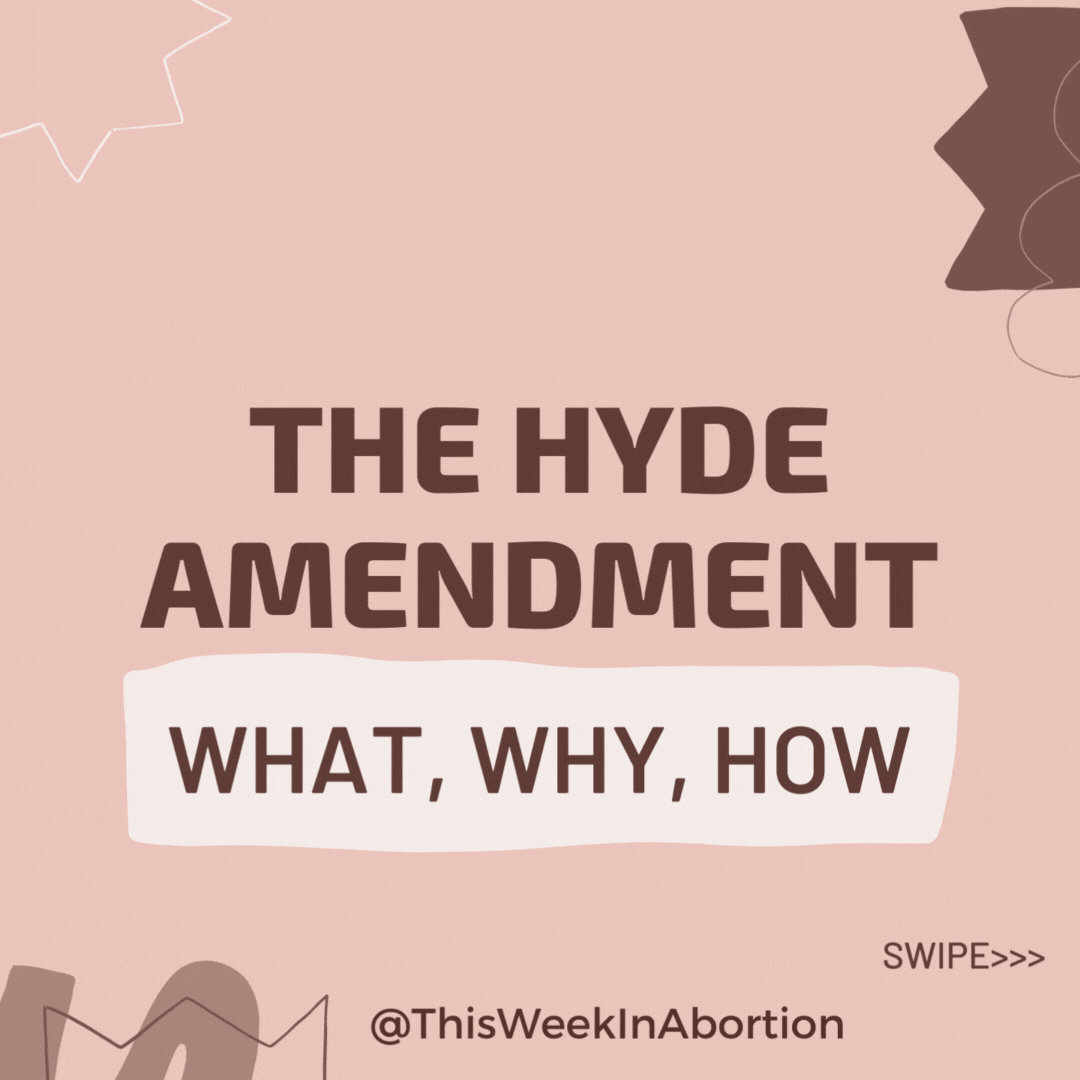This Week in Abortion: The End of the Hyde Amendment?
Your weekly roundup of good reads, legal updates, and legislative tracking on abortion.
Welcome back to your weekly roundup of good reads, legal updates, and legislative tracking on abortion. The news is blissfully light this week, so we are spending some time talking about ending the Hyde Amendment, which could be one of Congress’s big achievements this year.
Good Reads (and products!)
The AP started a tracker of many of the debates happening right now in courts and statehouses.
Planned Parenthood is shifting from a national to a local strategy, while we don’t like to see layoffs, the switch from a national to a local strategy is long overdue and we hope to see similar emphasis from large players in the pro-access space.
KFF Health News wrote an interesting piece on the (relatively effective) super-local strategy anti-access folks are leaning into.
On a roll, KFF Health News also put out this helpful report on the implications of the “exceptions” clauses in abortion laws.
Using technology in a new (and freaky!) way, an anti-access group in Wisconsin used geofencing to target patients at Planned Parenthood. Not cool.
A few weeks ago, Mollie was gifted a delicious Choice Kolsch from Minocqua Brewing in Wisconsin, where a percentage of the proceeds of each sale is donated to reproductive rights groups in the state where it was sold. Amazing concept! #notaninfluencer #justafan
State and Local Events of the Week
👍 Though not strictly good news, or strictly about abortion, we can’t help but be mildly amused as nine Senators in Oregon are now ineligible to serve another term. The (mostly Republican) legislators are participating in a walkout in part to prevent progressive legislation, including on abortion, from passing this year. With 10 unexcused absences, they are now ineligible to serve in the senate again. Bad for governing but on the scale of news these days we are giving a thumbs up.
👍 Arizona Gov. Hobbs vetoed two anti-access bills.
One would have made child support payments retroactive to the first positive pregnancy test. While the idea of the bill sounds great, it was really a backdoor step to abortion restrictions. As Caitlin Sievers reported, a sponsor of a similar bill “explicitly said that the bill was intended as a way to establish ‘that life begins at conception.’”
Hobbs also vetoed a bill that would have increased official monitoring of pregnant women who abused drugs.
👎 South Carolina passed a 6-week abortion ban. Happily, a judge prevented the bill from being enforced until the state Supreme Court has a chance to review it. While that is good news, the SC Court is not as access friendly as it was when it rejected a similar law in 2021. Time will tell.
👎 Ohio legislators agreed to put a ballot initiative to voters asking them to make it more difficult to approve ballot initiatives that change the constitution. This is in direct response to a pro-access abortion ballot initiative in Ohio, and seems like a bad long-term play for Ohioans (as we’ve covered before).
Legal Updates
👍 Closing the loop - The doctor from Indiana who performed an abortion on a 10-year-old rape victim from Ohio will not have her license revoked or any of the more extreme consequences that were pushed by Republicans and much of the media.
The state medical board fined her $3,000 and issued a “letter of reprimand.” In our read that’s already too much. But, it’s also an admission that despite all the effort and pressure from anti-access politicians on the multiple other “charges” brought against her, they could find nothing wrong.
👍 Eight more women have joined a lawsuit against the State of Texas, arguing that their lives were put at risk by the state’s abortion ban.
Two of the women, Kiersten Hogan and Elizabeth Weller, had their water break early and were made to wait until they were ‘sick enough’ to legally qualify for care. We hate that these women had to endure the torture they did, but we love that they are speaking up about it and holding the state to account.
👍 A Montana judge blocked the newly passed abortion restrictions, in an expected but still positive move. As a reminder, abortion is protected in Montana and has been successfully upheld under several challenges.
👍 A grand jury in Wyoming found enough evidence to proceed against arson charges for a woman who damaged an abortion clinic last year.
Feature: The End of the Hyde Amendment?
We don’t cover Congress much in this newsletter, because that’s just not where the action is right now. Congress is divided with a Republican House and Democratic Senate, that means on abortion nothing but posturing is likely to get done. However, there is at least one great thing that we might see this year - The end of the Hyde Amendment.
What is it?
The Hyde Amendment is a provision that has been included in every budget since 1976. See a dated but detailed rundown of the history by Emma Green.
It’s not a law. It’s just a rider in the federal budget that is re-upped every single year.
But, for decades it has prevented the U.S. government from funding healthcare related to abortions. While it might seem like small potatoes amid the bigger issue of losing the actual right to an abortion, it can matter a lot.
The best thing we hope to see from Congress this year is a budget without the Hyde Amendment.
Why does it matter?
Sen. Tuberville is now holding up something like 200 military appointments because he thinks the Pentagon’s policy of funding travel for service members who need an abortion conflicts with the amendment.
More importantly, it prevents federal dollars for Medicaid from paying for abortion except in cases of rape, incest or life endangerment.
This has predictably inequitable effects (more). Congressman Henry Hyde himself said, if he couldn’t stop all abortions at least he could stop poor people from getting them.
“I certainly would like to prevent, if I could legally, anybody having an abortion, a rich woman, a middle-class woman, or a poor woman. Unfortunately, the only vehicle available is the…Medicaid bill..” (Attributed to Congressman Henry Hyde (R-IL) during floor debate of the amendment )
The Hyde Amendment is also powerful signaling. Absent any other tangible changes, at least in the short term, the elimination of the amendment would still be a positive step.
A key strategy of the anti-access and (anti-contraception) movement has been to shift cultural conversations and we (on the pro-access side) should be thinking along those lines too. The Hyde Amendment is a moral stance, it says the federal government does not approve of abortions except in the worst of circumstances. By taking it away, the federal government comes a step closer to treating abortion as a basic form of healthcare.
Why are we hopeful?
It’s just in our nature. But also:
The good news is, Biden’s current budget proposal as introduced in March does not include the Hyde amendment. This gives us reason to hope that the amendment will finally be dropped.
The “don’t hold your breath” news is, we have seen this before. As a candidate Biden pledged to get rid of the Amendment, and last year’s budget proposal did just that. But, by the time the budget passed, the Amendment was right back in.
Thus, the “let’s get into gear” news is, we are a long way from a budget. Anti-access congresspeople can play games with the best of them. This week, Salon reported that a House panel advanced a 2024 budget bill that would block access to medicated abortion via telehealth. There is ample time for pro-access folks to play budget games as well!
As the fight over the debt ceiling continues, abortion is unlikely to be a front page issue. That usually benefits the anti-access side. So, we call on all government funding nerds to unite. Use your superpowers, stay tuned in and help your elected officials play the games!





